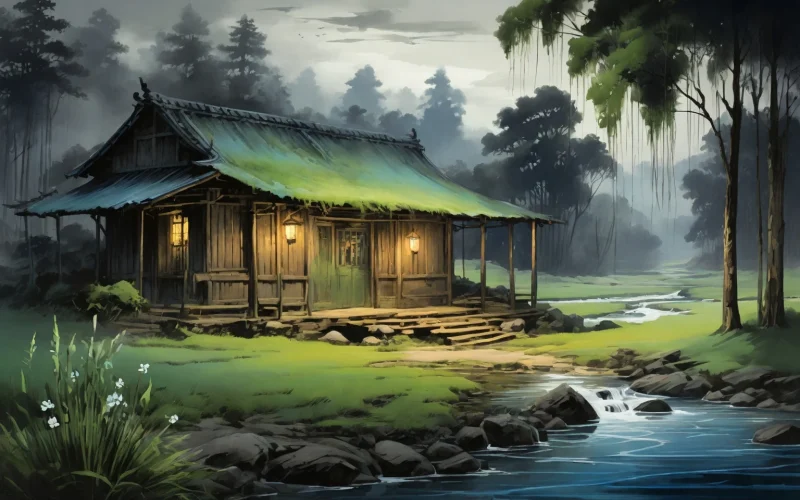Wild bamboos pierce the frigid stream,
Autumn’s cicadas chant through beams.
Since chaos came, no travelers pass—
Only frost-bent grass climbs stone steps, massed.
Original Poem
「宿洞口驿」
钱起
野竹通溪冷,秋蝉入户鸣。
乱来人不到,寒草上阶生。
Interpretation
This poem was composed in the late 8th century, during the lingering aftermath of the An Lushan Rebellion. As one of the "Ten Talents of the Dali Era," Qian Qi wrote this work while lodging at the desolate Kongkou Post Station during his travels. Through imagery of wild grasses and autumn cicadas in a deserted relay station, the poet conveys the depopulated landscapes and war-torn reality of the postwar era. The desolate setting mirrors his inner melancholy—economical in diction yet profound in meaning, leaving lasting reverberations.
First Couplet: "野竹通溪冷,秋蝉入户鸣。"
Yě zhú tōng xī lěng, qiū chán rù hù míng.
Wild bamboos stretch to cold creek beds,
Autumn cicadas pierce vacant rooms with their cries.
The opening couplet establishes an austere atmosphere. "Wild bamboos reaching the creek" suggests long abandonment of the post station, while the "cold" accentuates desolation. The cicadas' intrusive chirping—naturally mournful—heightens the silence within, creating poignant contrast.
Second Couplet: "乱来人不到,寒草上阶生。"
Luàn lái rén bù dào, hán cǎo shàng jiē shēng.
Since chaos came, no travelers pass by—
Chill grasses now climb the abandoned steps.
The second couplet identifies the desolation's cause: the An Lushan Rebellion. "No travelers" directly states the station's disuse, while "chill grasses climbing steps" uses scenery to crystallize emotion—implying both time's erasure and the world's stillness through vegetative encroachment.
Holistic Appreciation
Though merely four lines, each word in this poem is meticulously crafted, with layers of meaning unfolding progressively. It opens with "wild bamboo chills the stream", instantly evoking a desolate, secluded wilderness. The next line, "autumn cicadas cry indoors", shifts from visual to auditory imagery, deepening the sense of solitude. The latter half directly addresses the cause of abandonment—"since chaos came, no visitors"—while "cold grass climbs the steps" mirrors the passage of time and human desolation. Rather than overt lament, the poet uses stark realism to depict a fractured world and its suffering people.
post station, meant to be a hub of travel and communication, now lies overgrown, with insects chirping indoors—a microcosm of societal collapse. Concise yet profound, sorrowful yet restrained, the poem captures the melancholy of a solitary traveler in turbulent times.
Artistic Merits
- Emotion Through Scenery: Without explicit grief, every word carries sorrow—chill bamboo, cold grass, and cicada cries all mirror the poet’s state of mind.
- Structural Mastery: It moves from external (wild bamboo by the stream) to internal (cicadas indoors), then from observation to cause (chaos keeps visitors away), each layer distinct.
- Precision in Diction: The word "chill" sets the tone; "cold" deepens the closing sentiment—every syllable bears weight.
- Hallmark Dali Style: Delicate craftsmanship and poignant desolation epitomize the Ten Talents of the Dali Era.
Insights
This poem teaches us that brevity can carry profound history and emotion when scene and feeling fuse with linguistic precision. Without uttering "sorrow," Qian Qi immerses readers in post-war ruin, inviting reflection on life’s fragility and reality’s harshness. Today, we too can perceive in this silent station an era’s upheaval—an intellectual’s quiet lament for a shattered world and broken connections.
About the Poet
Qian Qi (钱起, c. 722-780), a native of Huzhou, Zhejiang, was the foremost of the "Ten Talents of the Dali Era" in mid-Tang poetry. His poetic style, inheriting Wang Wei's legacy, excelled particularly in regulated verse (五律), characterized by its ethereal elegance. Yan Yu praised his work as "innovative in form," reflecting the Dali period's transition from the High Tang's naturalism to refined craftsmanship.











